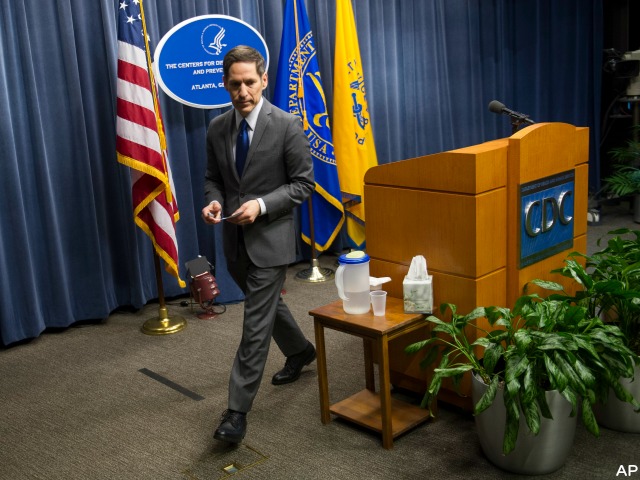Thomas Frieden, director of the Centers for Disease Control and Prevention (CDC), said during a news conference Wednesday that a Texas nurse should not have taken a flight the day before she was diagnosed with the deadly Ebola virus.
The CDC acknowledged on October 15th that a 26-year-old nurse named Amber Vinson became the second Texas hospital worker who contracted Ebola while treating Thomas Duncan; she tested positive for Ebola on October 14th. But the Washington Post reported Vinson had a potentially contagious fever of 99.5 degrees Fahrenheit before she boarded Frontier Airlines Flight 1143 back to Dallas-Fort Worth from Cleveland. The CDC said public health workers are trying to interview the 132 passengers.
Frieden declared, “Even though there appeared to be little risk for the other people on that flight, she [Vinson] should not have traveled that way.” He described Vinson as “ill but clinically stable” but stated CDC transferred her by medical air ambulance to Emory University Hospital to be near their headquarters in Atlanta.
A report by ABC’s WFAA news states that Frontier Airlines confirmed Vinson also flew to Ohio from Dallas-Fort Worth on Flight 1142 on October 10th; Vinson on her round trip flights would have come into contact with about 264 passengers and 10 crew members. However, during her time in Dallas-Fort Worth while suffering from a fever, Vinson could have had contact with up to 60,000 airport employees and 165,542 passengers that use America’s fourth busiest airport each day.
Although Frieden must have known about Vinson’s infection immediately, he told reporters yesterday that he commited CDC to launch a plan “For any hospital anywhere in the country that has a confirmed case of Ebola, we will put a team on the ground within hours,” which will include experts in infection control, protective equipment and experimental therapies. Frieden said he was motivated by nurse Nina Pham being the first person to contract Ebola on American soil.
In what almost sounded like an apology yesterday, Frieden added that, “Ebola is unfamiliar” and “It’s scary. I wish we had put a team like this on the ground the day the first patient was diagnosed. That might have prevented this infection.”
The stock market has been warning about the danger of Ebola, since airline stocks peaked on July 25th. This Wednesday, a mid-day 3% crash for the U.S. Standard & Poor’s 500 Stock Index and 4% wipe-out of airlines stocks followed the stunning news of Vinson’s diagnosis. Earlier on July 25th, the Nigerian Ministry of Health confirmed Ebola had broken out of isolated West Africa nations of Guinea, Liberia, and Sierra Leone with the diagnosis of a passenger named Patrick Sawyer with Ebola, who left a hospital in Liberia against the wishes of the medical staff and flew to flew to Lagos (population 21 million).
Sawyer died five days after arriving in Nigeria. Nigerian health officials extensively investigated phone records and flight manifests to find and intensely monitor for symptoms among the 900 people Sawyer might have exposed to the disease. Over the next month 19 Nigerians that contracted Ebola from Sawyer died.
With the scientific probability that the disease is an “aerosol-transmissible disease” gaining wider acceptance, airplanes seem to be the equivalent of flying Petri dishes to grow and widely distribute the Ebola virus. Commercial aircraft cabin ventilation systems recycle up to 50% of cabin air “20-30 times per hour.” Airlines filters act similar to surgical masks used in hospital operating theatres to trap most dust particles, bacteria, fungi, and viruses. But as Breitbart broke on October 14th, the Center for Infectious Disease Research and Policy advised CDC that since Ebola may be “transmitted by infectious aerosol particles”, a “surgical mask offers no or very minimal protection from infectious aerosol particles.” Consequently, airlines might recirculate 50% of breadth from a passenger infected with Ebola.
By the end of the trading day Wednesday, S&P 500 Index recovered to only down -0.8% and the airline stock index recovered to only down -0.6%. But the S&P Index is down -6% and the airline stock index is down -15% since July. But with the spread of Ebola accelerating, the future medical and economic impacts from Ebola could prove vastly underestimated.
Chriss Street suggests that if you are following the Ebola threat, please read MEDICAL RESEARCH ORG CIDRAP: EBOLA TRANSMITTABLE BY AIR.

COMMENTS
Please let us know if you're having issues with commenting.